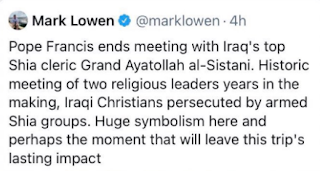The BBC News website's report on the historic meeting in Iraq yesterday between Pope Francis and Grand Ayatollah Ali al-Sistani has so far undergone 15 revisions.
The most dramatic changes came from BBC's Rome correspondent Mark Lowen, whose 'Analysis' got him into trouble.
Here are three chronological snapshots (courtesy of Newssniffer):
I
Profoundly symbolicAnalysisby Mark Lowen, Rome correspondentToday's meeting has been years, even decades, in the making: an encounter between the leader of the Catholic Church and one of the most powerful figures in Shia Islam.Previous popes have tried to meet him, given his influence across the Middle East.Today Pope Francis, in this first papal visit to Iraq, is achieving it: a hugely significant encounter for two religious leaders. Their talks were likely to focus on inter-faith dialogue and Iraq's Christian minority, long terrorised by Shia armed groups.It's a day of profound symbolism - and perhaps the one that will leave this trip's lasting impact.
II
Profoundly symbolicAnalysisby Mark Lowen, Rome correspondentThis has been a meeting years in the making: an encounter between the leader of the Catholic Church and one of the most powerful figures in Shia Islam: Grand Ayatollah Ali al-Sistani. For a pope passionate about reaching out to other faiths, the meeting is arguably the most symbolic moment of his visit to Iraq.The dwindling Christian community here has suffered violence at the hands of armed Shia groups - and the cleric is seen as a voice of moderation.The Pope now comes to Ur - the ancient birthplace of the prophet Abraham, hoping that the biblical figure revered by Christians, Muslims and Jews, can spur reconciliation today.III
Profoundly symbolicAnalysisby Mark Lowen, Rome correspondentThis has been a meeting years in the making: an encounter between the leader of the Catholic Church and one of the most powerful figures in Shia Islam: Grand Ayatollah Ali al-Sistani.For a pope passionate about reaching out to other faiths, the meeting is arguably the most symbolic moment of his visit to Iraq.The dwindling Christian community here has suffered violence at the hands of Sunni extremists but some also fear the presence of Shia armed groups - and the cleric is seen as a voice of moderation.The Pope visited Ur, the ancient birthplace of the Prophet Abraham, hoping that the biblical figure revered by Christians, Muslims and Jews, can spur reconciliation today.
As you can probably imagine, Shia people (inside and outside Iraq) didn't take too kindly to Mark Lowen's characterisation of who it is who has terrorised and inflicted violence on Iraq's Christian community. His tweet along the same lines of his earliest 'analysis'...
...had to be deleted. And people still aren't happy, demanding an apology from him:
Mark Lowen hasn't apologised to anyone yet, so far as I can see. He just amended his contribution to the BBC online article, deleted that tweet, posted another tweet along the lines of his latest 'analysis' and then took issue with someone who questioned that far more defendable post.



No comments:
Post a Comment
Note: only a member of this blog may post a comment.